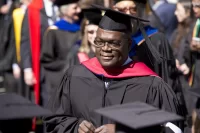
The students’ assignment: Write an op-ed about lead poisoning in Lewiston-Auburn. Or write a caption for a photo, or text about a campus tree. Write about how strange quantum theory is, or write a competitive book review in Japanese.
Their professors’ goal: Through solid writing, get students to persuade or inform. Help them understand the course material, whether it’s mathematics, environmental studies, or history. Get them to consider their own writing mistakes, or build up to a larger project.
Your assignment: Read about these 10 professors’ all-time favorite writing assignments, which they presented to their colleagues in the fall. What’s your favorite?
Biblio Battle Project
Instructor: Keiko Konoeda, Lecturer in Japanese
Course: “Advanced Japanese II”
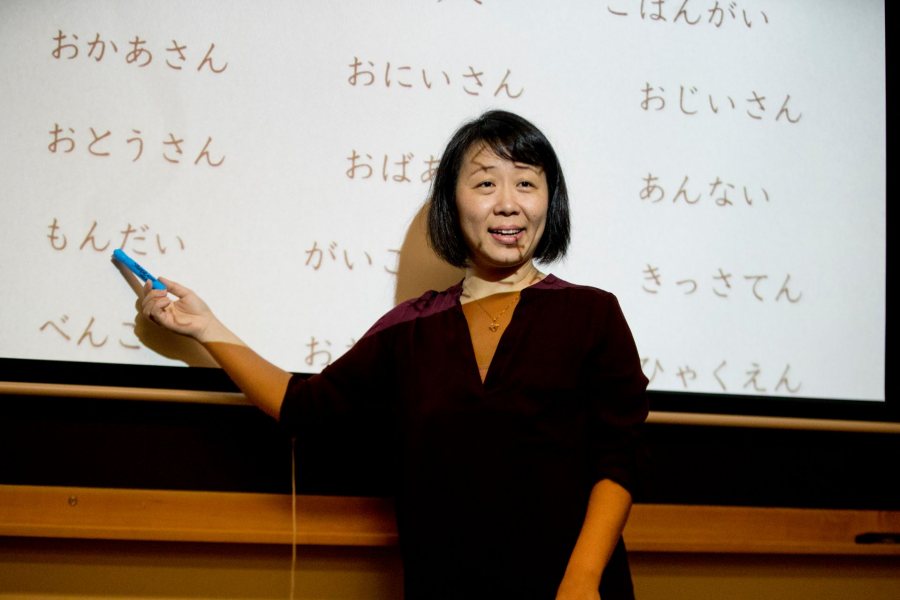
Lecturer in Japanese Keiko Konoeda teaches a section of Beginning Japanese I. (Phyllis Graber Jensen/Bates College)
Assignment: Each student writes a book review in Japanese, then turns that review into an oral presentation for the class. After each presentation, students discuss the book, and at the end, the participants vote for the book they most want to read. The assignment was inspired by Biblio Battles, a popular form of competition created by researchers at Kyoto University in Japan.
Why she likes the assignment: “I believe in combining writing and speaking, especially in the context of language courses, I also like to make writing assignments not only to develop writing expertise, but as a stepping stone to developing speaking. Many adult learners who learn a language in the classroom tend to develop writing before they become more comfortable in speaking.”
Op-Ed on Lead in Lewiston
Instructor: William Wallace, Lecturer in Education
Course: “The Environment and Social Justice,” First-Year Seminar
Assignment: First, write a two-page essay comparing and contrasting the issue of lead paint in Lewiston-Auburn neighborhoods with the drinking water crisis in Flint, Mich. Then, write a newspaper-style op-ed about the lead paint issue, using an op-ed about the Flint water crisis as an example.
As they geared up to turn in their final op-eds, Wallace’s students received help from, among others, Karyn Butts of the Maine Center for Disease Control & Prevention; former American Cultural Studies lecturer Christopher Petrella, and Lewiston Sun Journal reporter Lindsay Tice.
Why he likes the assignment: In their course evaluations, the students “said it was one of the highlights of the semester for them, because they felt like they were learning a new skill they didn’t know before. They knew how to write, but this was a type of persuasive writing that was politically active and important to them.”
Faulty Sentence
Instructor: Myra Wright, Lecturer in English
Course: “Reading Cats & Dogs,” First-Year Seminar
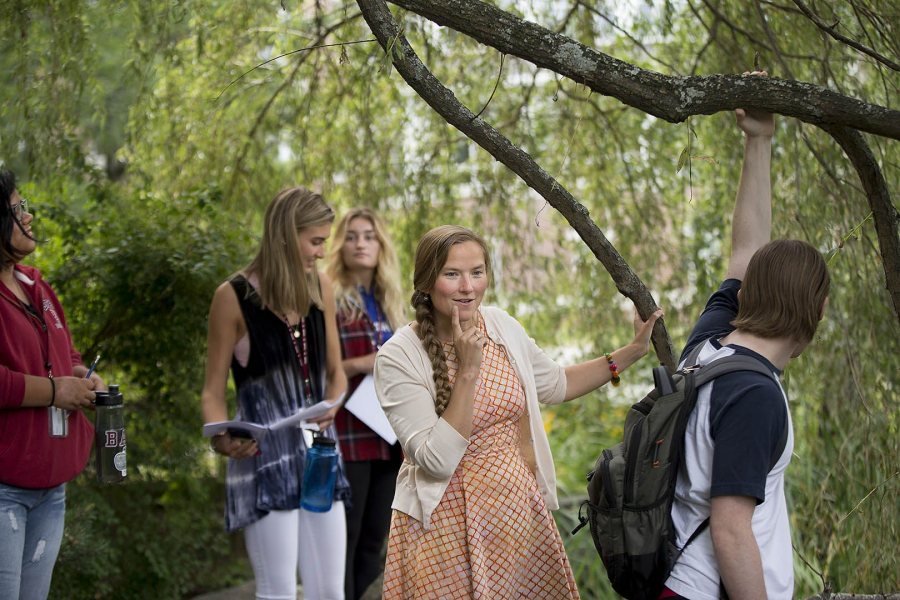
Lecturer in English Myra Wright teaches a section of “The Literary Insect,” her 2017 First-Year Seminar. This fall, she taught “Reading Cats and Dogs” to first-year students. (Phyllis Graber Jensen/Bates College)
Assignment: Students submitted a one-sentence analysis of the John Keats poem “To Mrs. Reynolds’ Cat” — but made sure the sentence contained one writing error the professor corrected in previous coursework. The class then discussed each sentence, complimenting each other’s writing, identifying the error, and discussing solutions.
Wright was inspired by Associate Professor of Politics Leslie Hill, who had told her about a similar process of identifying errors with her students.
Why she likes the assignment: “It allows me to be a real stickler but also make more friendly the work of doing excellent editing at an investigative, imaginative, and critical level.”
What Makes an Expert?
Instructor: Adriana Salerno, Associate Professor of Mathematics
Course: “Calculus I” (largely taken by non-math majors)
Assignment: Read “What Makes an Expert?” from Ken Bain’s What the Best College Students Do, then write an essay connecting the reading to your experience of taking the midterm exam. Address which example of an expert from Bain’s chapter resonated with you, the approaches to learning you take, and how you can improve your performance in the class.
Why she likes the assignment: I have so many students who are like, ‘I’m so bad at math, I’m not very good at this, I’m just here because I have to be.’ There’s a lot of that anxiety coming into a class like Calc I. This helps them think of how these experiences can be transferred to other things. … This kind of work, understanding that writing is also thinking and processing, gets them to do certain things that are really helpful in math.”
Natural History of a Tree
Instructor: Brett Huggett, Assistant Professor of Biology
Course: “Dendrology and the Natural History of Trees”
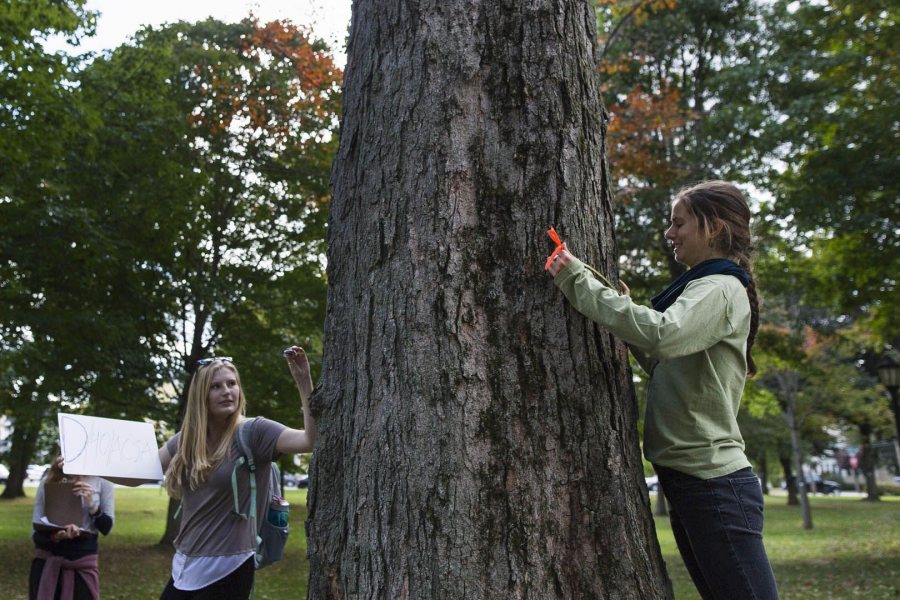
In 2015, Julia Fisher ’16 (right) of Philadelphia and Samantha Purnell ’18 of Portland, Ore., measure a tree on the Historic Quad. Their data was part of a webpage documenting the various species of campus trees. (Josh Kuckens/Bates College)
Assignment: Photograph and write a short essay about one campus tree species. Then, tag each tree with a small plate indicating the species name, family, and a QR code linking to a webpage with the student’s pictures and natural history essay.
Why he likes the assignment: “Writing is heavily emphasized in biology. Students are well-trained in the structure of scientific writing and the format of abstract, introduction, methods, results, and discussion. I felt there was a niche to create a writing assignment that asked students to write for the general public and step out of the framework of the rigid scientific structure.”
Toward a Philosophy of Nonviolence
Instructor: Stacy Smith, Lecturer in the Humanities
Course: “The Roots of Nonviolence,” First-Year Seminar
Assignment: Having read three texts that influenced Martin Luther King Jr. at the time of the Montgomery Bus Boycott, write a letter to King about these texts, asking King what you want to ask him and saying what you want to say. Use King’s “Letter from Birmingham Jail” or James Baldwin’s “Letter to My Nephew” as a model. Alternatively, write a prose essay using as a model King’s chapter entitled “My Pilgrimage to Nonviolence” from his book Stride Toward Freedom.
Why she likes the assignment: “I am really interested in cultivating student voice. I feel like I was quite successful as a student, and throughout my academic career, writing in a way where I wasn’t really there. What I’m interested in at this stage of my teaching career is cultivating the ‘alive’ human being, within the student and the teacher, in an academic setting. The personal is intellectual, and the intellectual is personal. This assignment is capturing that.”
Thinking About a Research Paper
Instructor: Joe Hall, Associate Professor of History
Course: “Maine Environment and History”
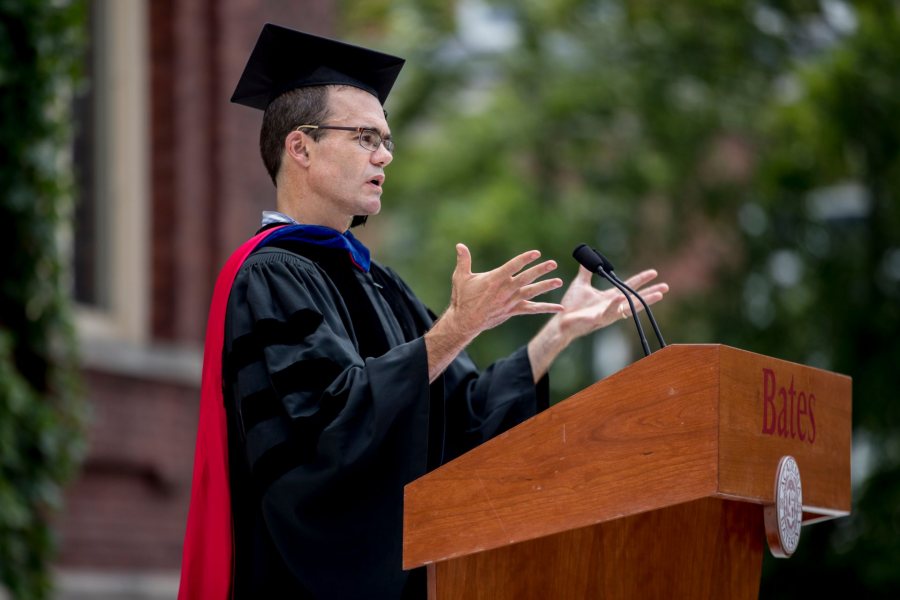
Associate Professor of History Joe Hall delivers the 2018 Convocation address in August. (Phyllis Graber Jensen/Bates College)
Assignment: In no more than four pages, explain how two works are helping you think about your 20-page research paper. Put the works in dialogue with each other. The grade on the final research paper replaces the grade on this preliminary assignment, if the final paper is better.
Why he likes the assignment: “The most useful element of the paper as a writing assignment was that it enabled me to tell all of them, because all of them needed to do this, how to use transitions to make an argument that consists of more than one piece. For a research paper, that is absolutely fundamental. Often, the single piece of advice I give my students for all of their papers is, ‘You have a really good summary of this piece and a really good summary of that piece. Tell me why they’re part of the same paper.’ That transition is where your argument is, and now you have an essay.”
Reflective Writing in Quantum Chemistry
Instructor: Lynn Mandeltort, Visiting Assistant Professor of Chemistry and Biochemistry
Course: “Quantum Chemistry” (mostly upper-level chemistry majors)
Assignment: Write two responses — a paragraph at the beginning of the semester, several pages at the end — to the strangeness of quantum theory, but also accurately describe quantum theory. “Construct concise, specific, logical prose connecting the ideas we have discussed thus far, while tying in your own experience.”
Why she likes the assignment: “In these technically based courses, students can go through the motions and give you an answer and not tell you why it matters or if that answer makes sense. What good is science then? … Writing is something you to do communicate broadly and make sure you understand something in a course like chemistry.”
Lewiston Triptych
Instructor: Jane Costlow, Clark A. Griffith Professor of Environmental Studies
Course: “Lives in Place” (mostly first-year and sophomore non-majors)
Assignment: Read an essay on how nature is embedded in urban spaces, even if we don’t recognize it as nature. Draw or photograph a material object at Museum L-A in downtown Lewiston, and take a picture of “nature” in Lewiston. Caption the photograph with a quote from the essay, and write a 300-word essay that connects the museum object and the photograph, offering a reflection on nature in L-A.
Why she likes the assignment: “These are wonderful essays about Lewiston-Auburn. If there’s not enough writing about Lewiston-Auburn, maybe my students can be doing some of that writing.”
Podcast Guest Profile
Instructor: Michael Sargent, Associate Professor of Psychology
Course: “Searching for the Good Life,” First-Year Seminar
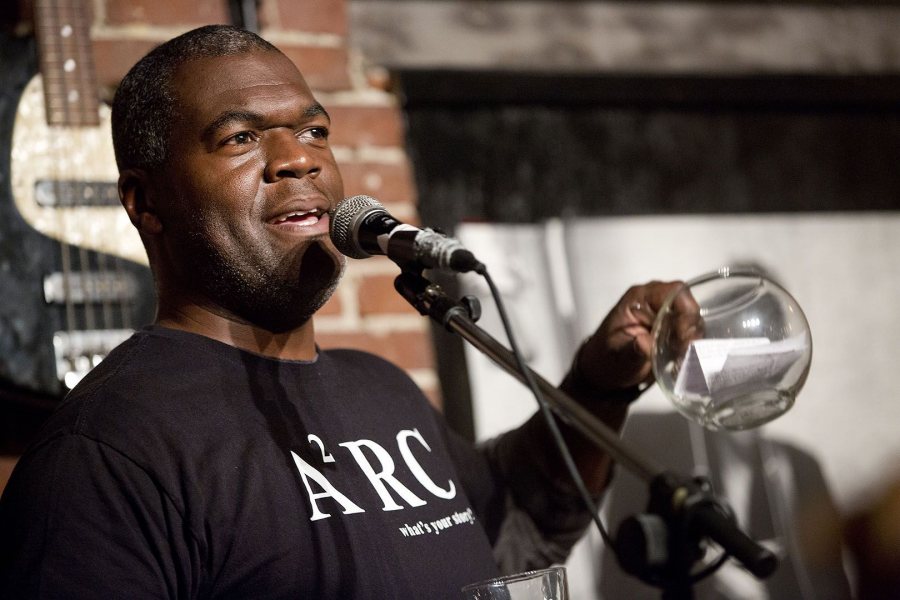
Pictured in 2014, Associate Professor of Psychology Michael Sargent hosts a storytelling event he founded. (Phyllis Graber Jensen/Bates College)
Assignment: To prepare for a group project involving making a podcast about an interesting person’s work, write a profile of your subject — focusing not on broad biographical details, but on specific aspects of their work. Develop one or two questions the work raises for you.
For example, students in the group interviewing a former deputy chief of staff to the U.S. Secretary of Defense wrote about such topics as a documentary film the deputy produced, women in the Department of Defense, and artificial intelligence.
Why he likes the assignment: Full disclosure, “this is not my favorite assignment,” Sargent says. “I used to have them write their own eulogy, and I’m really lucky that did not blow up in my face, at least to the best of my knowledge. I’ve dropped that assignment. I’m not taking any more chances.”
This assignment, however, was “writing in the service of some other purpose, and that made it come to life for them. They weren’t just writing for the sake of writing, valuable as it is. They were writing because they saw this as essential to help them get ready for these interviews.”




